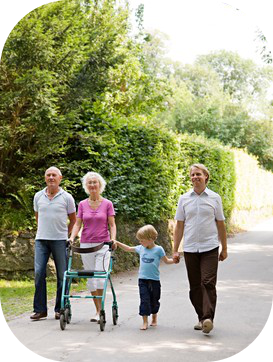Resilience May Help Us Stay Engaged in Life and Side-Step Depression
 What is this research about?
What is this research about?
Living with a condition like multiple sclerosis or spinal cord injury can be challenging and stressful, and can put people at risk for depression. However, many people who have these conditions still enjoy a high quality of life, are happy, and participate in their communities. We were interested in finding out why some people with chronic health conditions are happier and more involved in their communities than others. In particular, we wanted to find out whether people do better over time if they feel more resilient. Resilience describes someone’s ability to bounce back or recover after a stressful experience.
What did the researcher do?
We surveyed about 1,500 people with either muscular dystrophy, multiple sclerosis, post-polio syndrome, or spinal cord injury twice. In the first survey we asked them how resilient they felt in general, such as how well they adapt to changes or see the humorous side of problems. We also asked them about symptoms of depression (such as how often they felt sad or had trouble concentrating) and how satisfied they were with their participation in important activities, like doing household chores, working, and being part of family life. Then, three years later, we surveyed them again and asked them the same questions about their depression levels and their participation in activities, to look at changes over time.
What did the researchers find?
People who felt more resilient reported doing better on both surveys. They were less depressed and they were more satisfied with their involvement in family and community life. These patterns appeared on the second survey as well, showing that the more resilient a person was, the more their functioning improved over time. People in our sample who were more resilient were less likely to become depressed over the three years between surveys, and their community involvement increased more than those who were less resilient.
How can you use this research?
Resilience helps us cope well with stressful experiences over time. There are a few things we can do to increase our resilience:
- Spend time with friends and loved ones, especially when you are stressed.
- Regularly think about things and people you are grateful for.
- Make time to do things you enjoy and find meaning in. This might include making art or music, gardening, reading, watching funny movies, going to religious services, or volunteering.
- Learn techniques, such as mindfulness meditation, to help you better manage your thoughts and feelings.
What you need to know:
- People with chronic conditions are at a higher risk of feeling depressed. If you are worried that you or a loved one might be feeling depressed, please check out our factsheet on depression.
- Resilience can improve our quality of life during stressful experiences, and protect against negative reactions, such as depression.
About the researcher:
Arielle Silverman, PhD is a post-doctoral fellow with the Healthy Aging RRTC who is interested in social psychology, disability, and stigma.
Original research article:
Silverman, A. M., Molton, I. R., Alschuler, K. A., Ehde, D. M. & Jensen, M. P. Resilience predicts functional outcomes for people aging with physical disabilities. Archives of Physical Medicine and Rehabilitation. 2015 Mar 7 (Epub ahead of print).
Healthy Aging RRTC:
Factsheets - Aging Well with a Physical Disability:
- How to Stay Physically Active
- Hope to Cope with Depression
- How to Sleep Better
- Tips for Improving Memory & Thinking
- Employment Concerns
- How to Prevent Falls
- How to do a Lot with a Little: Managing Your Energy
- How to Get the Most Out of Your Health Care Visits
- How to Find Trustworthy Health Info from the Internet
- Provider's Guide for our Factsheets




